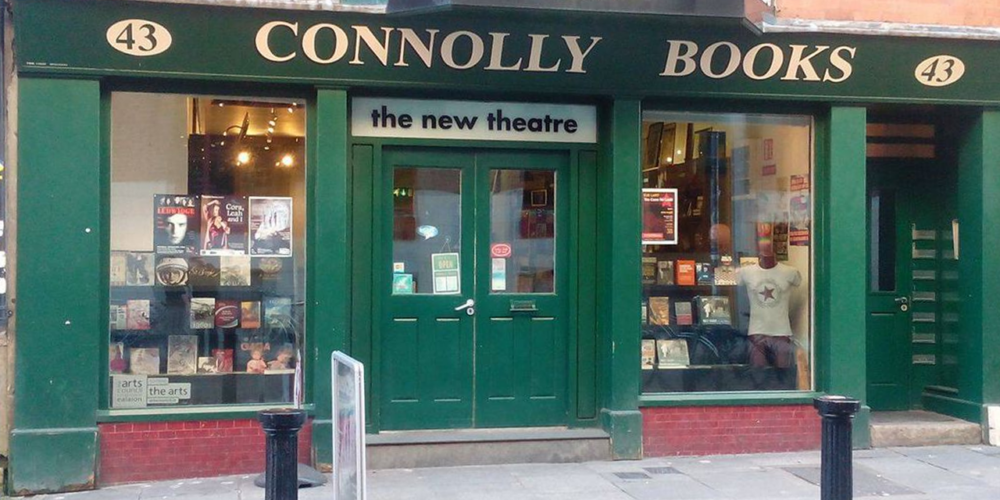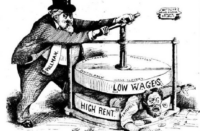Since the 1930s, New Books and Connolly Books have been publishing the writings of James Connolly (1868–1916), Ireland’s Marxist pioneer and martyr. Thousands of people first encountered Connolly through the re-publication of his writings in pamphlet and book form by New Books, including Labour in Irish History, Erin’s Hope and the New Evangel, The Reconquest of Ireland, and Labour, Nationality and Religion.
In 1987 Connolly Books published for the first time the principal works of Connolly in two volumes, under the title Collected Works, which are still available in the shop today in their distinctive green cover. Indeed an updated version is due to come out in 2023, with an introduction by the outgoing general secretary of the Communist Party of Ireland, Eugene McCartan.
The culture and politics of 1930s Ireland were not receptive to socialist ideas. The Constitution (Amendment No. 17) Act—sometimes referred to as the Coercion Act—introduced in October 1923 by the Free State government of Cumann na nGaedheal, and enforced also by later Fianna Fáil governments, treated socialist policies as subversive. Under this act twelve left-wing organisations were declared illegal. Conservative politicians were determined to keep Ireland a conservative Catholic country.
High unemployment and all-pervasive poverty marked life for people in both urban and rural areas during the 1930s. Wage cuts of up to 10 per cent were imposed on many of the workers who did manage to find work. The trade union movement, to all intents and purposes, forgot the legacy of Connolly, and his works were slowly disappearing from public access.
It was in this environment that the first socialist bookshop in Dublin was opened, in Winetavern Street. It closed after a very short time, because of pressure from the Franciscan Fathers in nearby Merchants’ Quay.
In 1932 the Revolutionary Workers’ Group opened a socialist bookshop at 64 Great Strand Street, which they called Connolly House. James Larkin Junior was one of the leaders of the RWG and also an elected member of Dublin City Council. The group published the weekly news-sheet Irish Workers’ Voice.
On 27 March 1933 a Lenten sermon delivered in the Pro-Cathedral against the “dangers” of socialism led to a mob being formed and marching on the bookshop. They ransacked the building and set it on fire; three people who were in the building were lucky to escape with their lives.
After the burning of Connolly House it became difficult to secure premises for the sale of literature perceived as left-wing, and it was not until 1942 that Johnny Nolan and Geoffrey Palmer secured a new premises, at 16A Pearse Street. It was decided to make a public appeal for funds to establish the bookshop, and donations ranging from 2 pence to £10 were received. In this way £100 was raised to establish the shop, which was called New Books.
This shop lasted a little longer than Connolly House, though history repeated itself in 1956 when it too was attacked. During the 1960s it was the only bookshop in Dublin selling the writings of Marx, Engels, and Connolly.
In 1971 the bookshop moved from Pearse Street to 14 Parliament Street, before moving in 1977 to 43 East Essex Street and in 1989 changing its name to Connolly Books. After a short period in temporary premises at 7 Bloom Lane, off Lower Ormond Quay, Connolly Books returned to the renovated Connolly House in Essex Street in February 2007.
The CPI’s headquarters in East Essex Street was also used as a late-night drinking venue, Club Sandino, in the 1980s and 90s. This after-hours club raised money for supporting the Sandinistas in Nicaragua and the coffee brigades.
Stories told by the house DJs, visitors and CPI members remember Club Sandino as drawing a very mixed crowd. Special Branch men and left-wingers of various shades—and uneasy alliances—visited the premise at different points and for very different reasons.
This included the space becoming popular with lesbians in Dublin, who used to be able to dance with each other without question or concern. One could argue that this could have been because many of the other club-goers were too busy paying attention to who else was there to notice people enjoying themselves on the dance floor. However, the CPI has long had a progressive stance on queer politics, and LGBTQ people were welcomed openly. This was almost a full year before homosexuality was legalised in Ireland.
Club Sandino was forced to close its doors in September 1992 after a raid led to the confiscation of its stock of beer and whiskey.
The bookshop maintains its proud rebellious tradition today, continuing to show support and solidarity for progressive and revolutionary movements at home and abroad. The shop operates as a progressive, non-sectarian left-wing political hub, providing space for various left and progressive groups in which to meet, drop leaflets and stickers, or just pop in for a chat.
At the rear of Connolly Books is the 66-seat New Theatre. This is the same name as that of the theatre established by Connolly in Liberty Hall more than a hundred years ago. The theatre provides support and a platform for new writers and also hosts the annual James Connolly Festival.
Just like the shop, the theatre challenges social inequality and the class barriers with which the arts are fraught. It encourages an inclusive and collective approach to artistic expression, providing a space in which to celebrate the rich working-class culture that exists in an ever-evolving Ireland. The theatre provides a space for artists to express the wealth of their culture and articulate the experience of their life.
Connolly Books celebrates ninety years of existence with an event on Friday 9 December, from 7pm, followed by the James Connolly Bookfair on Saturday December 17th from 10:00am to 3:30pm.
■ Keep up to date through Connolly Books’ social media platforms, @ConnollyBooks and the website connollybooks.org
■ Connolly Books is at 43 East Essex Street, off Parliament Street, Dublin, and is open from Tuesday to Saturday, 10:00am to 5:30pm






